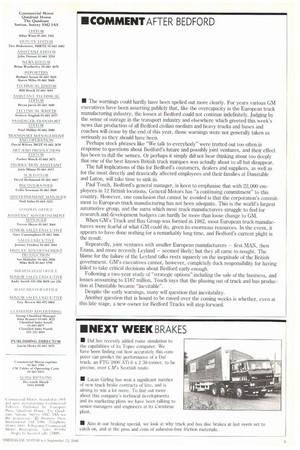• COMMENTAFTER BEDFORD
Page 5

If you've noticed an error in this article please click here to report it so we can fix it.
• The warnings could hardly have been spelled out more clearly. For years various GM executives have been asserting publicly that, like the overcapacity in the European truck manufacturing industry, the losses at Bedford could not continue indefinitely. Judging by the sense of outrage in the transport industry and elsewhere which greeted this week's news that production of all Bedford civilian medium and heavy trucks and buses and coaches will cease by the end of this year, those warnings were not generally taken as seriously as they should have been.
Perhaps stock phrases like "We talk to everybody" were trotted out too often in response to questions about Bedford's future and possibly joint ventures, and their effect has been to dull the senses. Or perhaps it simply did not bear thinking about too deeply that one of the best known British truck marques was actually about to all but disappear.
The full implications of this for Bedford's customers, dealers and suppliers, as well as for the most directly and drastically affected employees and their families at Dunstable and Luton, will take time to sink in.
Paul Tosch, Bedford's general manager, is keen to emphasise that with 22,000 employees in 12 British locations, General Motors has "a continuing commitment" to this country. However, one conclusion that cannot be avoided is that the corporation's commitment to European truck manufacturing has not been adequate. This is the world's largest automotive group, and the sums which most truck manufacturers struggle to find for research and development budgets can hardly be more than loose change to GM.
When GM's Truck and Bus Group was formed in 1982, most European truck manufacturers were fearful of what GM could do, given its enormous resources. In the event, it appears to have done nothing for a remarkably long time, and Bedford's current plight is the result.
Repeatedly, joint ventures with smaller European manufacturers — first MAN, then Enasa, and more recently Leyland — seemed likely; but they all came to nought. The blame for the failure of the Leyland talks rests squarely on the ineptitude of the British government. GM's executives cannot, however, completely duck responsibility for having failed to take critical decisions about Bedford early enough.
Following a two-year study of "strategic options" including the sale of the business, and losses amounting to £187 million, Tosch says that the phasing out of truck and bus production at Dunstable became "inevitable".
Despite the early warnings, many will question that inevitability.
Another question that is bound to be raised over the coming weeks is whether, even at this late stage, a new owner for Bedford Trucks will step forward.




























































































